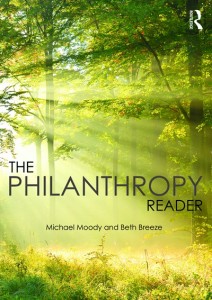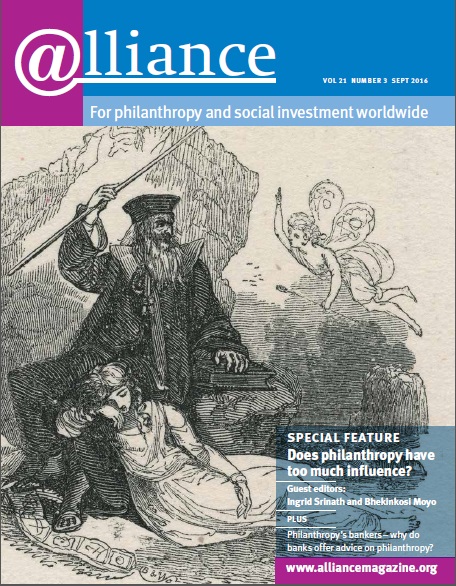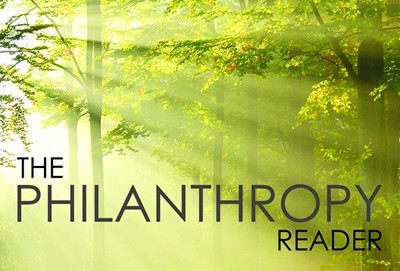Reviewed by Marta Rey Garcia
The Philanthropy Reader offers the obvious advantage over its online and digital competitors of being a one-stop publication, which is crucial given the fragmentation of the field of philanthropic studies across geographies and disciplines. It also presents a highly consistent and well-balanced selection of academic and non-academic excerpts, with complementary digital contents available as an e-resource.
 Beth Breeze and Michael Moody – its editors, and also authors – provide insightful comment and structure in
Beth Breeze and Michael Moody – its editors, and also authors – provide insightful comment and structure in
their introductions to its six sections: ‘What is philanthropy?’, ‘Philanthropy across time and place’, ‘Being a philanthropist: callings and critiques’, ‘Philanthropists and beneficiaries: a complex relationship’, ‘Philanthropic practices and institutions’ and ‘Debates about making philanthropy better’. The result is a true flow of arguments. There are pleasant surprises, too, beyond the well-trodden paths of Carnegie’s and other broadly disseminated American texts, surprises that range from horizontal philanthropy in Africa to bequests during Amsterdam’s Golden Age, from entrepreneurial China to modern India, from Latin America today to the Ottoman Empire.
The Philanthropy Reader comes both as a celebration and as a result of the recent growth of interest in philanthropic studies across different countries. This growth is evidenced by the number of papers on philanthropy that are presented in the main international conferences on the third sector, and the number of teaching and research centres addressing the issue.
The book is, however, afflicted by the same limitations as the emergent field of philanthropic studies internationally. The literature concentrates mainly on the two countries that tend to be responsible for it (the US and UK). Field development is still uneven, not only across geographic settings – even within continental Europe, as manifested by the demographics of the European Research Network on Philanthropy (ERNOP) – but also across themes of interest. Literature tends to deal with donors rather than with beneficiaries, focuses mainly on monetary giving and elite individual donors, and has yet to address relevant empirical gaps, most notably the gaps in our understanding of contextual factors.
Beyond these unavoidable limitations, one useful addition might have been a text from the Catholic Social Doctrine, as one of the main influencers of both elite and non-elite philanthropy in contemporary Mediterranean and Latin American countries. Anne Robert Jacques Turgot’s entry for ‘Foundation’ in the Encyclopédie might have been considered, as it not only formulates one of the most indisputable criticisms of foundations but also embodies the narrative that was responsible for their virtual dismantling across 19th-century Europe. I would also have liked to see Section 4 (on the complex relationship between philanthropists and beneficiaries) moved closer to the start of the book, as it contains the philosophical and ethical underpinnings of philanthropy.
That said, The Philanthropy Reader is just delightful to read. Although it is not a research-oriented resource, it is a powerful source of motivation for all of us studying philanthropy. It bluntly reminds us how natural philanthropy is to human life in society, and how relevant, fascinating and endless it is. It is a must for any of us teaching philanthropic studies, and an invaluable manual for anybody involved in the field – foundation trustees and staff, consultants, grantseekers, fundraisers and major donors. It includes not only the key labels and narratives that contribute to the legitimacy of philanthropy – creative, strategic, new, catalytic philanthropy; social entrepreneurship, blended value, corporate social responsibility – but also, and even more importantly, the main critical arguments against it. Long live philanthropy!
Marta Rey Garcia is associate professor, University of A Coruña, Spain and a board member of the European Research Network on Philanthropy. Email martarey@udc.es
Coming up in 2017: Philanthropy studies – an emerging field?
About the book
Published by Routledge
Price £35.99
ISBN 978-1138903593
To order http://www.routledge.com
This book has also been reviewed by Pat Danahey Janin. You can read her review here.







Comments (0)